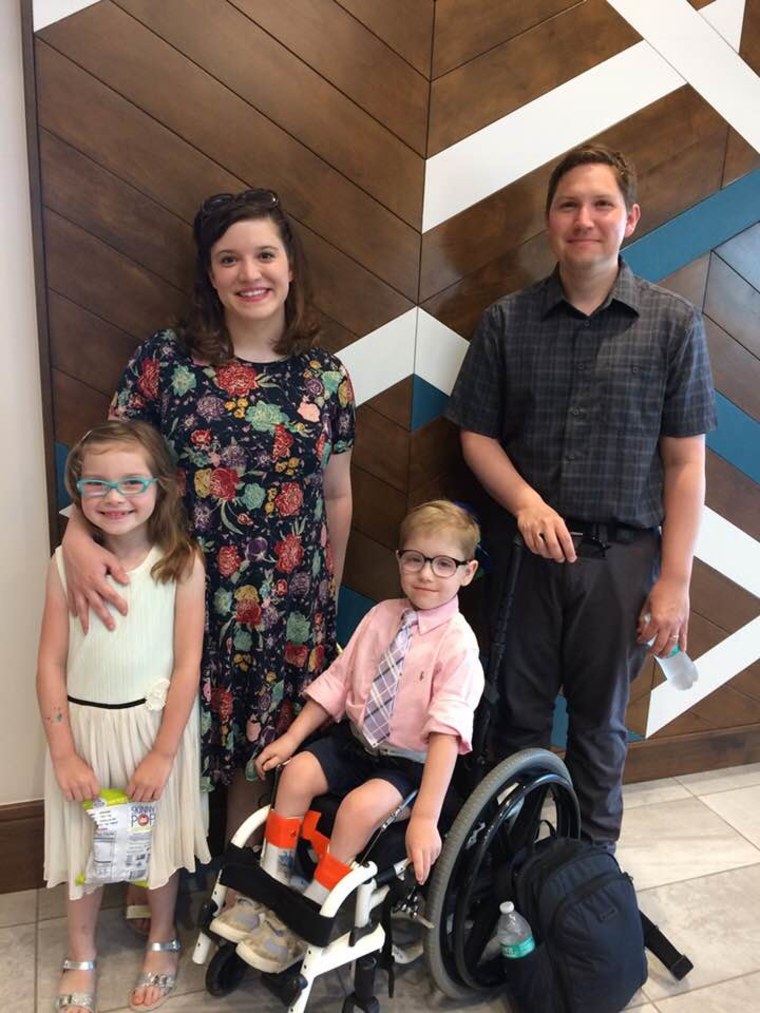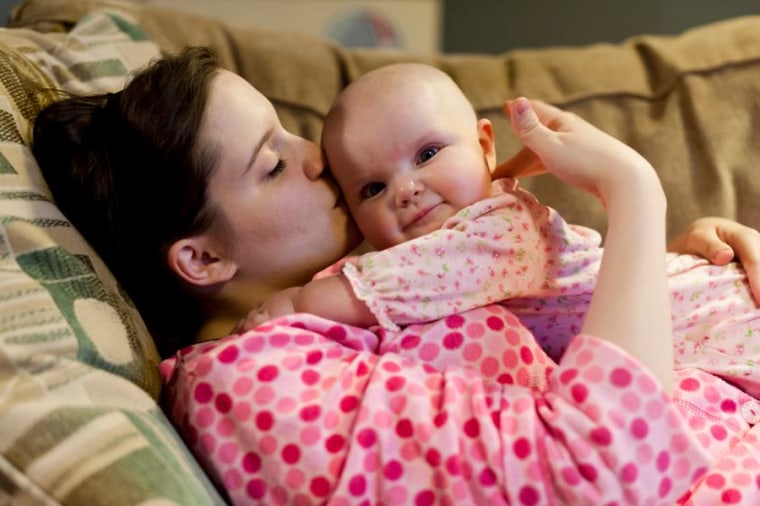My first baby, June, was born on a Thursday afternoon after 18 hours of contractions, one panic attack and two hours of pushing. Moments after she was born, but before I could hold her, I remember hearing what I thought was water splashing on the floor — and finding out quickly that the sound was actually blood pouring out of my body. The nurses jumped on me, pumping me with medicine to contract my uterus, while my obstetrician crammed her hand inside me, elbow-deep, to try to detach my placenta and stop the bleeding.
The team's quick thinking saved my life. But when I regained consciousness a few hours later, I was deeply shaken, woozy from the drugs and on the verge of needing a blood transfusion. After the nurse had palpated my uterus, I was so sore I could barely sit up. When the nurse placed my baby in my arms, June immediately started to cry, and reflexively I tried to hand her back.
I conceded that she was a very pretty stranger and wondered when the hospital would bring in her real parents so I could eat a cheeseburger and take a nap.
“She's all yours, mom!” The nurse chirped, and suddenly I felt like I was going to pass out again. Between the exhaustion of labor, the major hemorrhage and now the existential crisis of becoming a mother, I felt overwhelmed and hungry — not to mention a tad disappointed. Hearing stories from other moms during my pregnancy, I had expected to feel completely obsessed with my baby, strangely and wonderfully possessed by love like other moms had assured me I would be as soon as I laid eyes on her. Instead, I had barely caught a glimpse of her before flopping back on the delivery table and nearly bleeding to death. Now, in my arms, I conceded that she was a very pretty stranger and wondered when the hospital would bring in her real parents so I could eat a cheeseburger and take a nap.
Mother-child bonding is crucial, but it doesn't look the same for everyone
The science on mother-child bonding is pretty clear: It's crucial for raising healthy, well-adjusted kids. Parental bonding is linked to everything from the child's brain chemistry to their future adult relationships. (No pressure, right?) But not all bonding feels the same, say the experts, and many moms who don't feel that rush of love end up feeling guilty or ashamed. Heidi McBain, a licensed family therapist based in Texas, says a huge part of her clinical practice is working with new parents, many of whom find bonding with their baby difficult.
“I see a lot in my practice that moms are really upset because they meet their baby and they don't instantly fall in love,” she says. “That's an expectation that's coming from somewhere — their friends, family or on TV — and they're really upset when that doesn't happen.”
For some women, like me, it simply takes a while to get used to a new baby, and come to terms with our new role as “mom.”
“People forget that when you see this new baby for the first time, you don't really know each other,” McBain says. “A lot of moms meet their baby and they don't know them and they don't feel instantly connected. A lot of the work I end up doing is just letting them know that that's normal. As baby gets older, and mom gets more comfortable with being a mom, hour after hour, they start to bond.”
Another thing that gets in the way of bonding? Trauma. One recent study showed that up to four percent of women develop Post-Traumatic Stress Disorder (PTSD) after giving birth, and any kind of failed expectation, says McBain, be it a bad breastfeeding experience or a birth trauma, can interfere with bonding and even trigger postpartum depression and anxiety.
“We tend to have a lot of expectations of what we want our life to be,” says McBain. “It could be a mom who wants a natural birth and didn't get one, or a mom who can't breastfeed for whatever reason. When these expectations aren't realized, some people are fine, and for others it can be triggering. It can bring up issues from their relationships or from their past.”
McBain stresses that the bonding experience is different for everyone and every pregnancy, and there are many variations of what “normal” can look like. Anecdotally, I can tell you that's true. When I asked my friends and fellow moms about the bonding experiences with their children, nearly all of them confessed that it just depended on the circumstance: the pregnancy, how the birth went, the type of support they had, and even the kid itself. Some felt a gradual attachment, while others felt a bond when the baby learned to smile or sleep through the night. Like most things having to do with motherhood, everyone's experience is different, sometimes radically so.
Baby #2: Love at First Sight
Less than two years later, even though I had sworn up and down to my husband in the recovery room with June that I was never going through that again, we welcomed our second child, Henry, into the world. At twenty weeks, Henry had been diagnosed with a permanent birth defect, and as a result his birth could not have been more different: A planned C-section as opposed to an agonizing vaginal birth. Because of his birth defect, Henry was whisked away after birth for surgery, and between his surgery and mine, I wouldn't be able to hold him for the next several days. But the rush of love that had eluded me with June hit me like a tidal wave with Henry. In the home video we have of his birth, the OB is lifting him over the curtain for us to see his face, and I'm squealing between tears. “How are you so beautiful?” I keep shouting. “Oh my God! Wow!” I was in love.

Contrast that with June: Although I felt protective of her, it wasn't until we had been discharged for a week that I finally felt something toward her that resembled love. One day, during a nap, my mom brought the baby to me and told me that it looked like she needed to nurse. Suddenly, two simultaneous thoughts popped into my head. The first was "didn't I just feed her?!" The second was "yay – I get to see her again!" As I fed her, I realized I was stroking her skin, smelling her, talking to her softly. Hey, I thought. I love her now!
In hindsight, I have no idea why the bonding experience with our second was so radically different than the first. It could have been that Henry's birth was easy and painless, or it could have been that Henry's diagnosis made him more vulnerable and, as such, easier to attach to. Or maybe it was that, with my first, I simply needed time and space to adjust to my new role as “mom” and to this needy, wailing stranger who had just totally upended my life. My experience with bonding was unique with each of them, and I've made my peace with it.
For this reason, when a mom tells me she's nervous about having a baby, I make sure to tell her that it's totally normal if she feels "meh" about the baby at first — truly. We have a culture that's deeply anxious about raising children and extremely prescriptive about how it should be done, causing many moms to panic if they think they're “doing it wrong.” I make sure to tell them that neither of my kids had skin-to-skin time with me in the first hour of their lives, nor did they breastfeed immediately after birth, nor could I hold them for several hours – all things that are supposedly crucial to developing that mother-child bond. And while parental bonding is truly important, in the end it didn't matter what I did initially or how I felt toward them: Eventually, I ended up completely in love with them, regardless. Somehow, love snuck in.
MORE STORIES ON NAVIGATING MOTHERHOOD
- How your brain changes after baby
- Whitney Port on the unique struggle of millennial moms
- 3 things moms don't need to worry about when going back to work
- What it's like to give up alcohol in a 'wine mom' world
- America has a motherhood problem — here's how to solve it
Want more tips like these? NBC News BETTER is obsessed with finding easier, healthier and smarter ways to live. Sign up for our newsletter and follow us on Facebook, Twitter and Instagram.
